Tattoos are more than just art; they are a form of personal expression, a snippet of one’s soul etched into the skin. Among the myriad of designs that tattoo enthusiasts choose, one that stands out both for its striking imagery and deep symbolism is the Medusa tattoo. This ancient figure, entwined in Greek mythology, carries a tale that resonates through the ages, making Medusa tattoos a powerful statement of strength, transformation and empowerment. Medusa tattoo nowadays used by women who survived a sexual assault or rape. Let’s learn the answer of “What does a Medusa Tattoo Mean?” and discover the meaning of Medusa tattoo.
Table of Contents
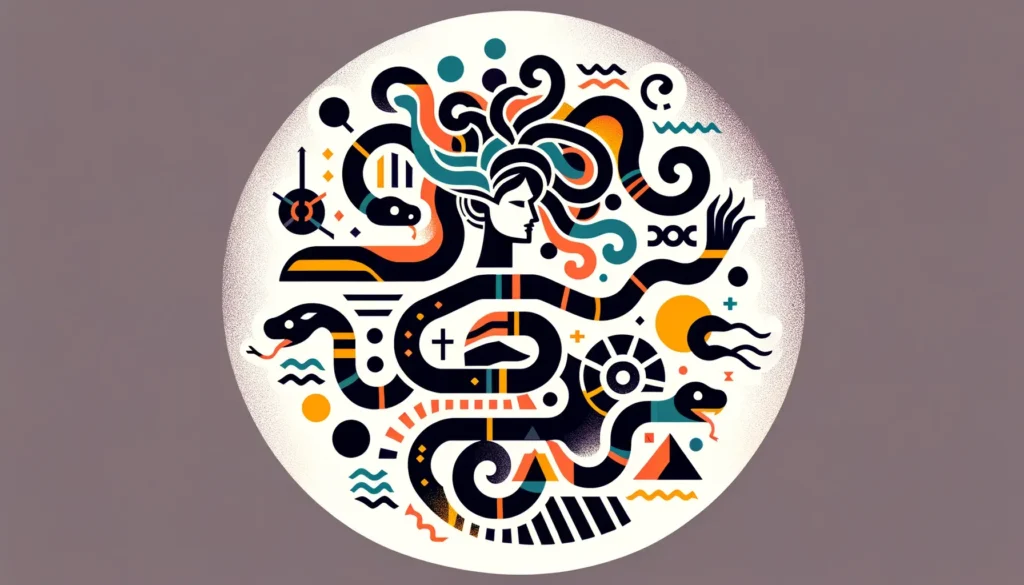
The Historical and Mythological Background of Medusa
To fully grasp the profound meaning behind a Medusa tattoo, it’s essential to dive into the waters of Greek mythology and history. Medusa’s story begins as a beautiful maiden, a priestess serving in the temple of Athena, the Greek Goddess of wisdom and war. Her beauty wasn’t just renowned; it was captivating enough to catch the attention of Poseidon, the Greek Sea God. This liaison, however, incited the wrath of Athena. In a turbulent turn of events, Athena transformed Medusa’s luscious locks into venomous snakes and cursed her with a gaze that turned onlookers to stone.
Exiled to a desolate island, Medusa became synonymous with fear and terror. Her tragic tale culminated in a fateful encounter with Perseus, who, using a polished shield as a mirror to avoid her petrifying gaze, ended her sorrow-laden existence. From Medusa’s severed head sprang Pegasus, the winged horse and Chrysaor, a golden giant, marking an end as dramatic as her life.
This narrative, rich in symbolism, sets the stage for understanding the complex layers of meaning associated with Medusa tattoos. It’s a story of transformation, from beauty to beast, from revered to reviled and finally, to a symbol of empowerment in contemporary interpretations.

Common Interpretations of Medusa Tattoos
The Medusa tattoo is a tapestry of meanings, each thread representing a different facet of its wearer’s beliefs, experiences, or aspirations. At its core, the Medusa tattoo is a symbol of power, transformation and protection. The image of Medusa, with her serpentine hair and piercing gaze, embodies a formidable blend of beauty and terror, a duality that resonates deeply with many.
For some, a Medusa tattoo signifies transformation. It speaks to the metamorphosis of one’s life, personal growth through challenging times, or even a radical shift in perspective. Medusa’s story, after all, is one of drastic change – from revered maiden to monstrous Gorgon.
Protection is another central theme. In ancient mythology, images of Medusa were used as protective amulets, warding off evil and bad luck. In modern times, this aspect has evolved but remains relevant. For many, a Medusa tattoo serves as a shield against adversity, a symbol of strength in the face of life’s Medusa-like challenges.
Lastly, the Medusa tattoo stands as an emblem of power. It’s not just about physical or supernatural strength, but also about the power of resilience, of enduring and overcoming. It’s a statement of defiance against the odds, much like Medusa herself, who, despite her story’s tragic elements, has emerged as a symbol of indomitable spirit.
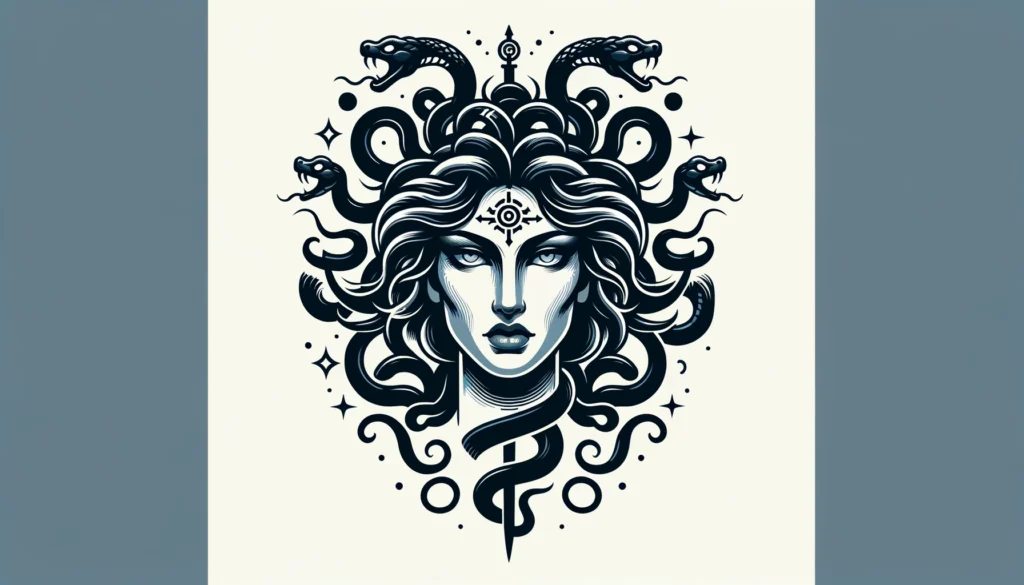
Meaning of Medusa Tattoo
The “medusa tattoo meaning” carries a depth of symbolism that intertwines ancient mythology with contemporary narratives of empowerment and resilience. To understand the meaning behind a Medusa tattoo, one must explore the various layers that compose its rich symbolism.

Mythological Roots: In Greek mythology, Medusa was a Gorgon, often depicted with a head of snakes and a gaze that turned onlookers to stone. The story of Medusa, from her transformation from a beautiful maiden to a fearsome creature, forms the foundation of the tattoo’s symbolism. This mythological context provides a backdrop of power, mystery and transformation.
Empowerment and Resilience: In modern interpretations, the Medusa tattoo is often associated with empowerment, especially for those who have faced adversity or personal trials. It symbolizes the strength to overcome challenges and the resilience to navigate life’s complexities. For many, Medusa represents not a monster, but a survivor, an icon of defiance and endurance.
Feminism and Protection: Medusa tattoos are particularly resonant within feminist narratives. They are seen as symbols of female strength, autonomy and protection against male violence or dominance. The image of Medusa serves as both a guardian and a reminder of the power inherent in femininity.
Transformation and Renewal: The story of Medusa is one of drastic transformation, making her image a powerful symbol for change and renewal. It speaks to the ability to emerge from difficult circumstances with newfound strength and perspective.
Personal Significance: Beyond these broader themes, the meaning behind a Medusa tattoo is deeply personal. It can represent an individual’s journey, battles, triumphs, or a personal connection to the mythological lore.
In essence, the meaning behind Medusa tattoos is as varied as the individuals who wear them. It’s a symbol that transcends time, culture and personal experience, embodying a spectrum of meanings from empowerment and resilience to transformation and renewal.
Medusa Tattoo Meaning for Women
While we discover what does a Medusa tattoo mean, we should mention that the meaning of tattoo changes for male and female. For tattoo art, Medusa holds a special place for many women. Here, she is not just a mythological figure but a symbol of female empowerment, resilience and transformation. For women, a Medusa tattoo often signifies the strength to overcome personal battles, the resilience in the face of adversity and the transformative journey of reclaiming one’s power.
The story of Medusa, seen through a modern lens, resonates with the narrative of survival. Many women view Medusa not as a monster, but as a survivor, someone who endured and stood tall despite her circumstances. In this light, Medusa tattoos become a powerful emblem of overcoming trauma, particularly in contexts of assault or abuse. It’s a silent yet potent statement of “I have survived, I am strong.” Medusa tattoo for women may mean that she survived a sexual assault or rape.
Moreover, Medusa’s duality of beauty and ferocity mirrors the societal challenges women often face, where strength and vulnerability coexist. In her, many find a kindred spirit, a guardian who embodies the courage to face life’s harsh realities while maintaining one’s grace and dignity.
For women, therefore, a Medusa tattoo is much more than an artistic choice; it’s a personal declaration of empowerment, a badge of honor and a source of unyielding strength.

Medusa Tattoo Meaning for Men
To understand the medusa tattoo meaning for men, we should first know that the Medusa tattoo often takes on a slightly different but equally profound symbolism for male. It becomes a symbol of courage, resilience and a deep connection to the rich tapestry of Greek mythology. In many ways, it reflects a journey of facing one’s fears, confronting challenges head-on and emerging stronger.
Medusa, in the eyes of many men, represents the ultimate challenge – a fearsome adversary who demands respect and bravery. By choosing a Medusa tattoo, men align themselves with the valor of Greek heroes like Perseus, who faced Medusa not with brute force, but with cunning and resolve. It’s a nod to the idea that true strength lies not only in physical power but in the ability to think strategically and act wisely.
Additionally, Medusa tattoos for men can symbolize protection and guardianship. Just as Medusa’s image was once used as a protective symbol in ancient times, men today may choose this tattoo to signify their role as protectors, whether it’s in a physical, emotional, or spiritual sense.
In essence, for men, a Medusa tattoo often goes beyond the aesthetic. It’s a symbol of the complex interplay between power, intelligence and courage – qualities that define the quintessential hero in Greek mythology and in life.
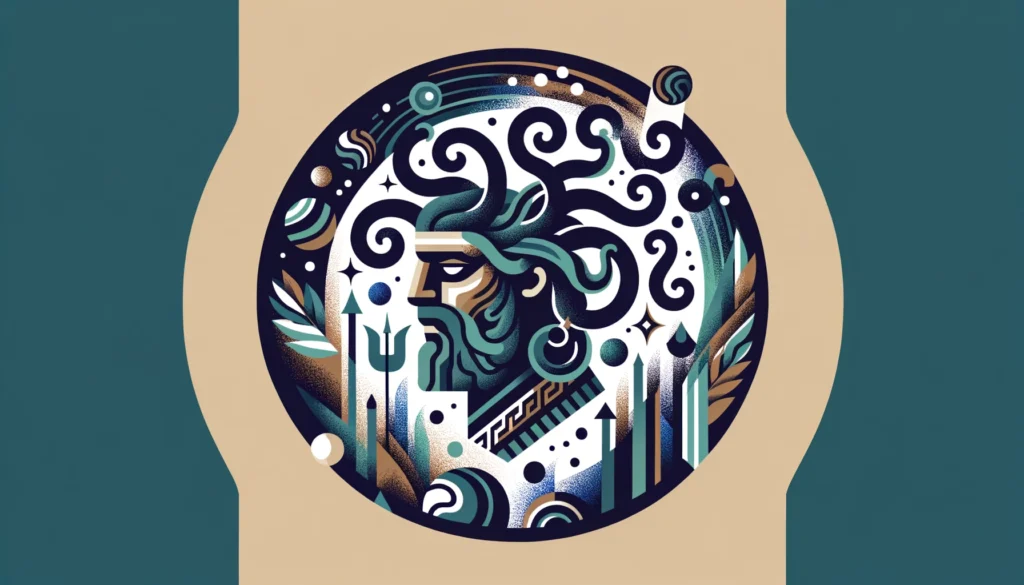
Influence of Design Elements on Medusa Tattoo Meaning
The allure of a Medusa tattoo is partly in its versatility. Different styles and design elements can dramatically alter the tattoo’s meaning, making it a deeply personal expression for the wearer. Let’s explore how various artistic interpretations of Medusa tattoos convey different symbolism:
- Black & Grey Medusa Tattoos: These designs often evoke a sense of seriousness, darkness and power. The monochromatic scheme highlights the intricate details and adds a dramatic effect, emphasizing the strength and formidable nature of Medusa.
- Realistic Medusa Tattoos: These tattoos remind us of Medusa’s humanity, portraying her as a once living, breathing person. They often capture the tragic beauty of Medusa’s story, reflecting the complex interplay between beauty and monstrosity.
- Graphic Medusa Tattoos: Favored by the artistically inclined, these tattoos draw heavily from ancient Greek art and mythology. They are often bold and abstract, offering a modern twist on the classic legend.
- Illustrative Medusa Tattoos: With a style reminiscent of comic books or cartoons, these tattoos put a contemporary spin on Greek folklore. They often represent a blend of nostalgia and myth, appealing to those who cherish the stories of their childhood.
- Other Styles: From neo-traditional to sketchy, dot-work to American traditional, each style adds its unique flavor to the Medusa myth. Whether it’s through bold lines, delicate dot-work, or vivid colors, each tattoo is a distinct narrative in itself.
Through these varying styles, a Medusa tattoo can be a canvas of personal significance, cultural homage, or artistic expression, each stroke and shade adding layers to its meaning.

Cultural and Personal Significances of a Medusa Tattoo
The cultural and personal significances of a Medusa tattoo are as layered and profound as the myth itself. This symbol transcends mere aesthetics, embodying narratives of empowerment, transformation and resilience.
Empowerment and Feminism: In contemporary culture, Medusa has been reclaimed as a feminist icon, representing female rage, strength and resistance against oppression. For many women, a Medusa tattoo is a symbol of empowerment, a reminder of their strength and independence. It’s a statement of owning one’s story and standing tall in the face of societal challenges.
Transformation and Resilience: Medusa’s transformation from a beautiful maiden to a fearsome Gorgon mirrors the personal transformations many experience in their lives. A Medusa tattoo can signify one’s journey through significant changes, overcoming hardship and emerging stronger. It’s a testament to the human spirit’s resilience, the ability to adapt and thrive despite adversities.
Protection and Healing: Just as Medusa was once used as a talisman to ward off evil, her image today continues to serve as a symbol of protection. For some, it’s a protective charm against bad luck or negativity. For others, especially those who have survived trauma or abuse, it’s a symbol of healing and a protective shield guarding their journey towards recovery.
Connection to Mythology and History: Beyond personal symbolism, a Medusa tattoo also reflects a connection to the rich tapestry of Greek mythology and ancient history. It’s a nod to the enduring power of these stories and their relevance in modern times.
In every line and curve of a Medusa tattoo, there lies a story, a piece of the wearer’s soul. Whether as a mark of empowerment, a symbol of transformation, or a protective charm, the Medusa tattoo holds a profound place in the hearts of those who choose to bear her image.
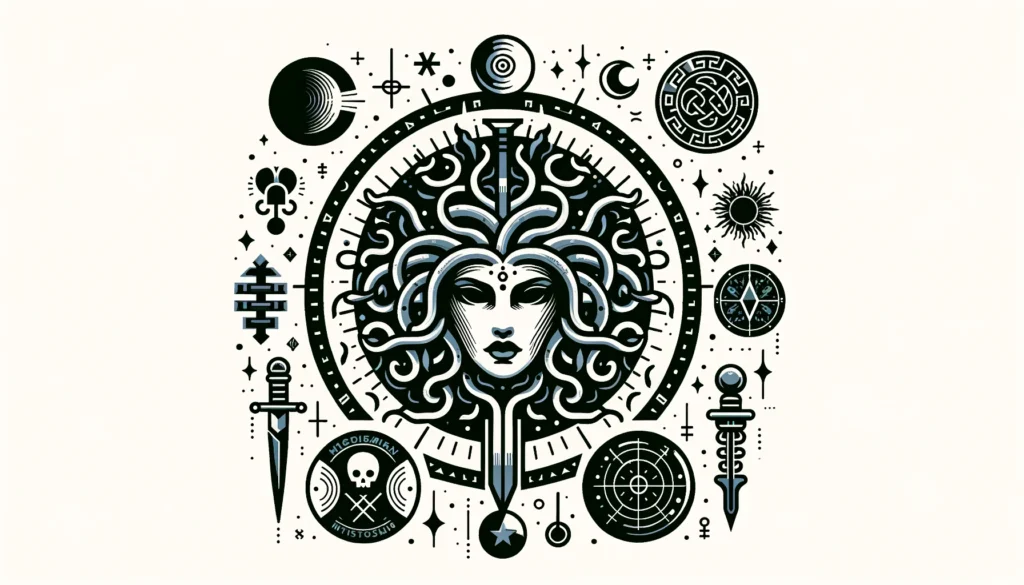
Evolution of Perceptions of Medusa Tattoos
The perception of Medusa tattoos has undergone a remarkable evolution, mirroring the broader changes in societal attitudes and cultural narratives. This transformation from a symbol of fear and monstrosity to one of empowerment and resilience is a fascinating journey through time and changing perspectives.
From Fear to Empowerment: Traditionally, Medusa was viewed as a monstrous figure, a symbol of fear and danger. In ancient times, her image was often used as a protective amulet, signifying the power to ward off evil. However, in this role, she was more feared than admired, a representation of the dangers lurking at the edges of the known world.
Redefining Strength: Over time, the narrative surrounding Medusa began to shift. Rather than a symbol of pure terror, she started to be seen as a representation of strength in adversity. This change aligns with a growing societal recognition of the complexities of victimhood and survival, especially in the context of abuse and assault.
A Modern Symbol of Resilience: Today, Medusa stands as a potent symbol of resilience and empowerment. Her story is reinterpreted as one of unjust punishment and survival against all odds. In contemporary culture, especially within feminist circles, Medusa is often embraced as a figure who defies victimization, representing the strength to overcome and the courage to defy.
Personal and Collective Narratives: The changing perceptions of Medusa tattoos reflect both personal and collective narratives. For individuals, she represents personal battles, transformation and empowerment. Collectively, her evolving image signifies a societal shift towards a more nuanced understanding of strength, resilience and the complexities of human experience.
This evolution of Medusa from a figure of fear to a symbol of empowerment highlights the dynamic nature of cultural symbols and their ability to adapt and resonate across different eras.
Medusa Tattoo Ideas
Here are some Medusa tattoo ideas for men:

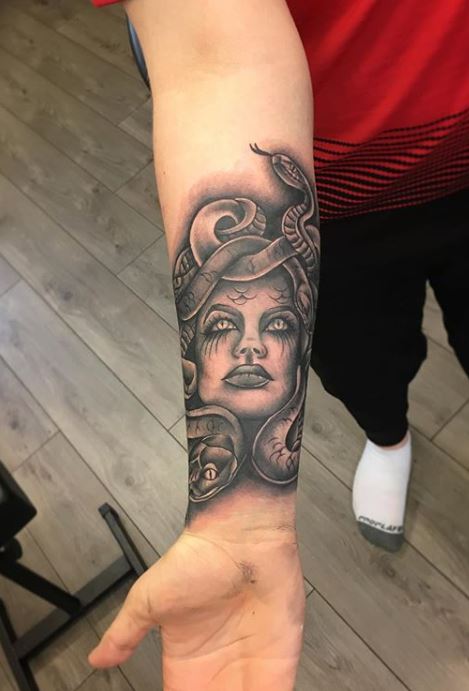
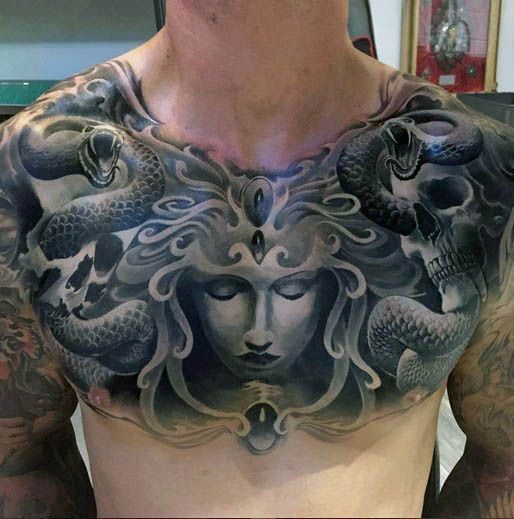
Here are some Medusa tattoo ideas for female:



Final Thoughts on What Does a Medusa Tattoo Mean
As we journey through the intricate layers of Medusa tattoos, we uncover a narrative rich in symbolism, history and personal significance while we learn what does a Medusa tattoo mean. From a feared figure in ancient mythology to a contemporary icon of empowerment and resilience, Medusa’s image has transcended time, evolving into a multifaceted symbol deeply embedded in our cultural fabric.
For those who choose to wear Medusa’s image, the tattoo goes beyond mere aesthetics; it’s a personal emblem of strength, transformation and empowerment. Whether seen as a guardian, a symbol of resilience, or a representation of one’s personal journey, a Medusa tattoo holds profound meaning.
This evolution from fear to empowerment not only reflects the changing perceptions of Medusa but also mirrors the societal shifts in understanding strength, resilience and the complexities of the human experience. In the end, a Medusa tattoo is more than an artistic expression; it’s a testament to the enduring power of myths and their ability to inspire, empower and transform.
If you liked our “What Does a Medusa Tattoo Mean?” post, don’t forget to check our other contents! Follow TattooMean.Com to discover more tattoo meanings!


Pingback: What Does a Semicolon Tattoo Mean? | TattooMean.Com
Pingback: What Does a Butterfly Tattoo Mean? | TattooMean.Com
Pingback: What Does a Teardrop Tattoo Mean? | TattooMean.Com